Khushwant SinghFKC was an Indian author, lawyer, diplomat, journalist and politician. His experience in the 1947 Partition of India inspired him to write Train to Pakistan in 1956, which became his most well-known novel.
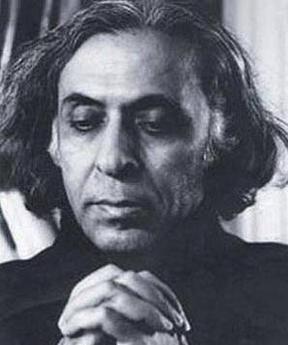
Raja Rao was an Indian-American writer of English-language novels and short stories, whose works are deeply rooted in metaphysics. The Serpent and the Rope (1960), a semi-autobiographical novel recounting a search for spiritual truth in Europe and India, established him as one of the finest Indian prose stylists and won him the Sahitya Akademi Award in 1963. For the entire body of his work, Rao was awarded the Neustadt International Prize for Literature in 1988. Rao's wide-ranging body of work, spanning a number of genres, is seen as a varied and significant contribution to Indian English literature, as well as World literature as a whole.
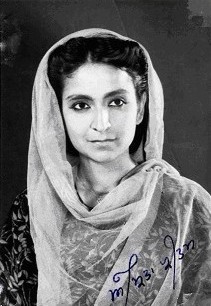
Amrita Pritam was an Indian novelist, essayist and poet, who wrote in Punjabi and Hindi. A prominent figure in Punjabi literature, she is the recipient of the 1956 Sahitya Akademi Award. Her body of work comprised over 100 books of poetry, fiction, biographies, essays, a collection of Punjabi folk songs and an autobiography that were all translated into several Indian and foreign languages.

Nikah halala, also known as tahleel marriage, is a practice in which a woman, after being divorced by triple talaq, marries another man, consummates the marriage, and gets divorced again in order to be able to remarry her former husband. Nikah means marriage and halala means to make something halal, or permissible. This form of marriage is haram (forbidden) according to the hadith of Islamic prophet Muhammad. Nikah halala is practiced by a small minority of Muslims, mainly in countries that recognise the triple talaq.

Train to Pakistan is a historical novel by writer Khushwant Singh, published in 1956. It recounts the Partition of India in August 1947 through the perspective of Mano Majra, a fictional border village.
Indrani Aikath Gyaltsen (1952–1994) was an Indian novelist and columnist.
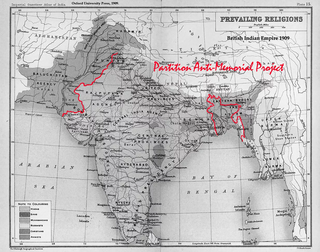
The Partition of India and the associated bloody riots inspired many creative minds in the republics of India, Pakistan, and Bangladesh to create literary/cinematic depictions of this event. While some creations depicted the massacres during the refugee migration, others concentrated on the aftermath of the partition in terms of difficulties faced by the refugees in both side of the border. Even now, more than 60 years after the partition, works of fiction and films are made that relate to the events of partition. W.H. Auden in his poem "Partition" showed the dilemmas of Cyril John Radcliffe, 1st Viscount Radcliffe, responsible for deciding which parts of India went where.

Sarojini Sahoo is an Indian feminist writer, a columnist in The New Indian Express and an associate editor of Chennai-based English magazine Indian AGE. She has been enlisted among 25 Exceptional Women of India by Kindle Magazine of Kolkata. and is an Odisha Sahitya Academy Award winner.

Train to Pakistan is a 1998 Indian Hindi film adapted from Khushwant Singh's 1956 classic novel by the same name set in the Partition of India of 1947 and directed by Pamela Rooks. The film stars Nirmal Pandey, Rajit Kapur, Mohan Agashe, Smriti Mishra, Mangal Dhillon and Divya Dutta.

Rajinder Singh Bedi was an Indian Urdu writer of the progressive writers' movement and a playwright, who later worked in Hindi cinema as a film director, screenwriter and dialogue writer and he is grandfather to Rajat Bedi and Manek Bedi.
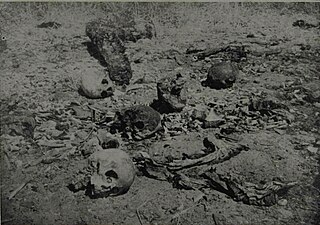
Sardarji jokes or Sardar jokes are a class of religious jokes based on stereotypes of Sikhs. Although jokes about other religious, ethnic and linguistic communities are found in various regions of India, Sardarji jokes are the most widely circulated religious jokes and found across the country. Sardarji jokes are generally considered tasteless and inappropriate by members of the Sikh community, and have elicited protests as well as leading to arrests for hurting religious sentiments.

Krishna Sobti was an Indian Hindi-language fiction writer and essayist. She won the Sahitya Akademi Award in 1980 for her novel Zindaginama and in 1996, was awarded the Sahitya Akademi Fellowship, the highest award of the Akademi. In 2017, she received the Jnanpith Award for her contribution to Indian literature.
Gurdial Singh Rahi was an Indian writer and novelist who wrote in Punjabi. He started his literary career in 1957 with a short story, "Bhaganwale." He became known as a novelist when he published the novel Marhi Da Deeva in 1964. The novel was later adapted into the Punjabi film Marhi Da Deeva in 1989, directed by Surinder Singh. His novel Anhe Ghore Da Daan was also made into a film of the same name in 2011 by director Gurvinder Singh. Singh was honoured with the Padma Shri in 1998 and Jnanpith Award in 1999.

Gulzar is an Indian Urdu poet, lyricist, author, screenwriter, and film director known for his works in Hindi cinema. He is regarded as one of greatest Urdu poets of this era. He started his career with music director S.D. Burman as a lyricist in the 1963 film Bandini and worked with many music directors including R. D. Burman, Salil Chowdhury, Vishal Bhardwaj and A. R. Rahman. Gulzar also writes poetry, dialogues and scripts. He directed films such as Aandhi and Mausam during the 1970s and the TV series Mirza Ghalib in the 1980s. He also directed Kirdaar in 1993.
Bihar has produced a number of poets and writers in its languages like Bhojpuri Maithili language, Magahi language, Angika and Bajjika including Bhikhari Thakur, Heera Dom, Viveki Rai,Satishwar Sahay Verma, Pandey Kapil etc are writers of Bhojpuri, Vidyapati in Maithili. Besides its regional languages, Bihar has also produced writers in English such as Raj Kamal Jha, Amitava Kumar, Tabish Khair, Gunjesh Bond, Abhay K, Kumar Vikram, Siddhartha Chowdhury; and Hindi including Raja Radhika Raman Prasad Sinha, Kumar vansi, Acharya Ramlochan Saran, Acharya Shivpujan Sahay, Divakar Prasad Vidyarthy, Ramdhari Singh 'Dinkar', Ram Briksh Benipuri, Phanishwar Nath 'Renu', Gopal Singh "Nepali", Ramesh Chandra Jha and Baba Nagarjun. Writer and Buddhist scholar Mahapandit Rahul Sankrityayan was born in Uttar Pradesh but spent his life in the land of Buddha, i.e., Bihar. Hrishikesh Sulabh is a short story writer, playwright and theatre critic. Arun Kamal and Aalok Dhanwa are poets.
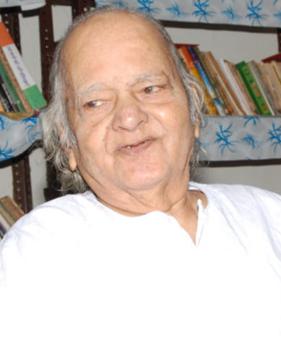
Amarkant was an Indian writer of Hindi literature. His novel Inhin Hathiyaron Se earned him the Sahitya Akademi Award in 2007, and Vyas Samman in year 2009. He was awarded Jnanpith Award for the year 2009. Amarkant is considered one of the prominent writers of the story writing tradition of Premchand but certainly is credited to add something better in that tradition by his own individuality.
"Karma" is a short story written by Indian writer Khushwant Singh. It was originally published in 1989 in Singh's The Collected Stories.

Mohan Deep, is an Indian writer. He has written multiple books on Bollywood film personalities, including the books: The Mystery and Mystique of Madhubala, Simply Scandalous: Meena Kumari, and Eurekha!: The Intimate Life Story of Rekha. In recent years, he has focused on writing fiction. Two of his novels are The Five Foolish Virgins (2013) and Color Me Rich (2016).
K. L. Gauba, also known as Kanhaiya Lal Gauba or Khalid Latif Gauba, was an Indian lawyer, writer, politician, and son of Lala Harkishen Lal. Born into a Hindu family, Gauba later converted to Islam and was elected to the Punjab Legislative Assembly by a Muslim constituency. He emigrated to India following partition and died in poverty.
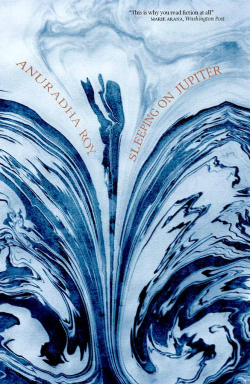
Sleeping on Jupiter is a novel by Anuradha Roy. It is her third novel and was published by Hachette India on 15 April 2015. It was longlisted for the 2015 Man Booker Prize and shortlisted for the 2015 The Hindu Literary Prize. It won the 2016 DSC Prize for South Asian Literature.














